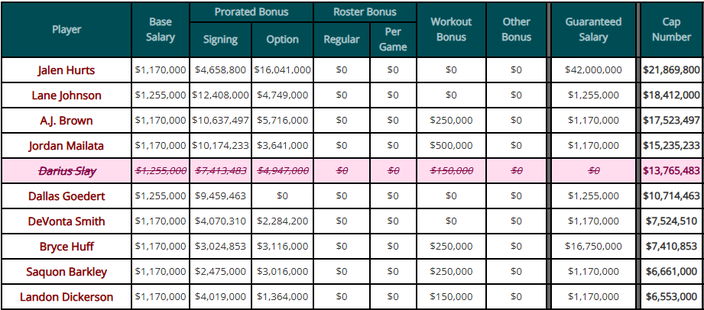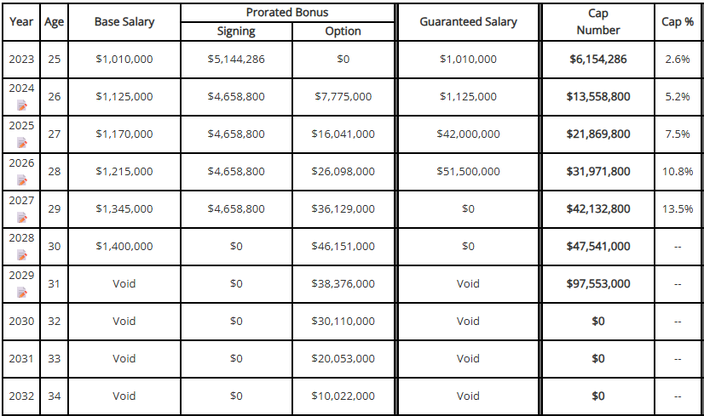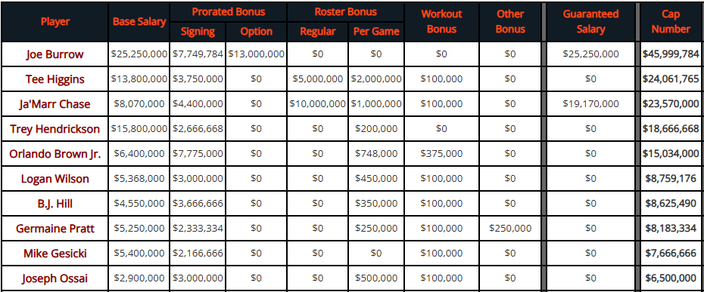Think the NFL's attempts to ban the "Tush Push" were aimed at taking away a Philadelphia Eagles advantage? Well, that's small potatoes compared to what the league could be seeking to strip from the Birds at some point in the future.
One of the great advantages the Eagles have — maybe their biggest advantage — is the way they structure player contracts. They get use of players now, get charged for their services on the salary cap later.
Let's start with a simple example. Let's use Mekhi Becton, who signed with the Eagles last year on a one-year deal worth about $5.5 million. Becton counted for about $2 million on the Eagles' cap in 2024, the lone year he played in Philly. He'll count for about $3.5 million in "dead money" in 2025, when he'll play for the Chargers.
Before we continue on with this example, let's first show how the NFL salary cap has increased each year:
| Year | NFL salary cap |
| 2025 | 279.2 million |
| 2024 | 255.4 million |
| 2023 | 224.8 million |
| 2022 | 208.2 million |
| 2021 | 182.5 million |
If Becton had counted on the salary cap for the full $5.5 million in 2024, he'd have eaten up about 2.2 percent of the Eagles' cap. Instead, at $2 million, he ate up 0.8 percent.
Becton's remaining $3.5 million counted toward the 2025 cap in the form of a "void year." As the above chart shows, the NFL's salary cap rose by about $24 million from 2024 ($255.4 million) to 2025 ($279.2 million), a 9.3 percent increase. In other words, the bulk of Becton's salary cap charges were paid in a year in which the salary cap was higher, and thus easier to fit.
Let's compare that example to a mortgage. As any homeowner is aware, a mortgage is a loan you get from a lender to finance a home purchase. When you take out a mortgage, you promise to repay the money you’ve borrowed in future years with an agreed-upon interest rate tacked on.
In terms of NFL contracts, spreading out base salaries over several years is similar to taking out a mortgage on a player, in that you get the use of that player now, while paying for him later. The big difference is that NFL teams pay no interest for that right, while interest-free mortgages on houses don't exist.
NFL teams can borrow from future years to expand their current spending ability, again, with no interest penalties.
That may not seem like a big deal for one player like Becton making average NFL money, but the Eagles employ this strategy with almost every player they sign, drafted rookies or players making league minimums excluded. It adds up.
A more extreme example is Jalen Hurts, who is the highest-paid player on the team, at five years, $255 million, or $51 million per year. His salary cap structure on OverTheCap.com looks like this:
If we were to simply take Hurts' $51 million per year, and apply it to each year, he would count for 18.3 percent of the Eagles' 2025 cap. At a cap number of roughly $21.9 million in 2025, he only counts for about 7.8 percent.
Of course, the Eagles are going to have to pay on the back end of this contract, but, I mean, the salary cap will be what in 2029? At the rate it has been increasing in recent years, like $400 million? And guess what? If Hurts is still a winning player in a few years, he'll get a new deal, and his salary cap commitments will be pushed out even further.
So what is the mechanism to be able to push all this money into future years?
The short-short answer is that the Eagles convert base salaries into bonuses, which can be spread out across future years. It requires a willingness from the owner to pay cash upfront. Jeffrey Lurie is willing to do that to help Howie Roseman pay as many good players as possible, while many other owners around the league are not.
In February, Bengals QB Joe Burrow lamented that his team's ownership does not take the same approach as the Eagles' during an appearance on the podcast "Pardon My Take." Via the Cincinnati Enquirer:
"The Eagles are paying everybody," Burrow said on the podcast. "That seems like the way, whatever they're doing…
"You could convert some of the money to a signing bonus, which will lower the cap hit," Burrow said. "You can push some of the money to the back end of the contract. That lowers the cap hit. … And then when you get to the back end of the contract, you can restructure it and convert it to a signing bonus."
As noted above, the Eagles push salary cap commitments into future years with every player they can. Here are their top 10 cap commitments in 2025, via OverTheCap:

Note the "base salary" column above. That column counts 100 percent toward the team's current salary cap, but again, it can be converted into bonuses that are spread out into future years. As you can see, every player in the above chart has a base salary of a little over $1 million. The Eagles knock their players' base salaries down to the lowest available limit with every contract, and instead convert that money into prorated bonuses.
Now, note the "cap number" column all the way to the right. Those are very low numbers relative to the rest of the NFL.
Compare those two columns with the Bengals' top 10 cap commitments in 2025:
Look at the Bengals' "base salary" and "cap number" columns. They are both considerably higher than the Eagles', even though the Eagles have more star players. If Bengals ownership wanted extra cap space to sign, ohhhh, saayyyy, Trey Hendrickson to a fair deal, they could very easily convert about $24 million of Burrow's base salary into bonuses, and spread them over future years. They just don't want to plunk down cash upfront.
So that brings us to the question, "How might the NFL try to take this massive advantage away from the Eagles?" Well, to be determined, but it seems they're at least beginning to discuss it.
NFL Commissioner Roger Goodell said owners had a lengthy discussion at the league meetings about the salary cap system — how well it’s working, whether teams are operating within its intended spirit, and what changes might be needed in the next round of collective bargaining with… pic.twitter.com/qYxDF9cbMi
— Ari Meirov (@MySportsUpdate) May 25, 2025
The full tweet, so you don't have to click:
NFL Commissioner Roger Goodell said owners had a lengthy discussion at the league meetings about the salary cap system — how well it’s working, whether teams are operating within its intended spirit, and what changes might be needed in the next round of collective bargaining with the players’ union.
In short: Owners are already looking ahead to potential changes to keep the system fair, competitive, and free of loopholes.
At the risk of jumping to a conclusion, it feels a lot like the cheap owners saw the Eagles maximize their spending all the way to a Lombardi Trophy, and they don't want to have to do the same to be able to compete.
Follow Jimmy & PhillyVoice on Twitter: @JimmyKempski | thePhillyVoice
Like us on Facebook: PhillyVoice Sports
Add Jimmy's RSS feed to your feed reader

